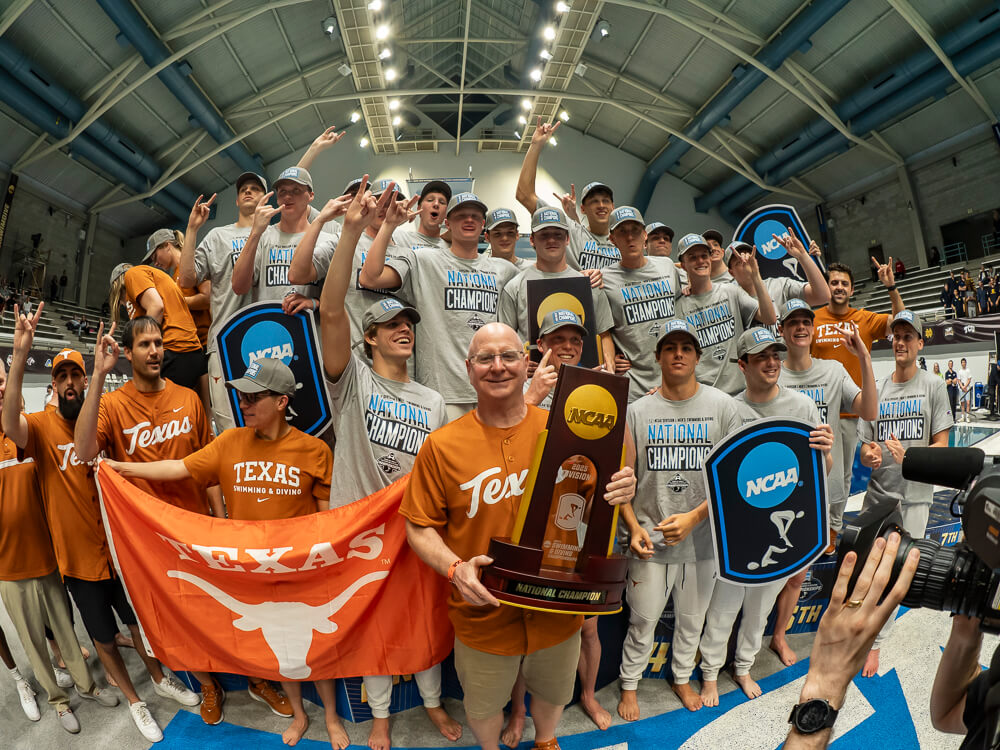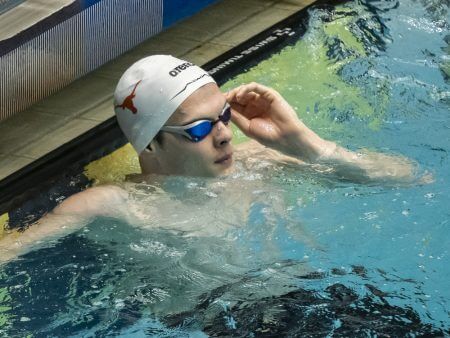Hook’ Em: Texas Captures 16th National Title Behind Hubert Kos, Bob Bowman and Reassembled Roster

Hook’ Em: Texas Captures 16th National Title Behind Hubert Kos, Bob Bowman and Reassembled Roster
A seventh-place finish at last year’s NCAA Men’s Championships was a highly unusual result for a University of Texas team so accustomed to finishing atop the table.
During the four decades in which Eddie Reese helmed the program, Texas won 15 national titles, the most all-time by a single swimming program (men’s or women’s) and by a single coach. For 15 consecutive national meets from 2008 through 2023, Texas finished in the top three, and it would have been 16 if not for the cancellation of the 2020 meet by the COVID-19 pandemic.
The 2024 season was an aberration, Reese having already announced his retirement (for the second time) and the program’s future uncertain. Less than 48 hours later, the team announced Bob Bowman would take over, and he would put together a title-winning squad in his first year.
“I’m really proud of this team because they didn’t know me, I didn’t know them. It was a little rocky at first trying to figure everything out,” Bowman said. “I remember in our first team meeting saying that we could contend for a championship. In here, I was like, ‘Maybe next year.’ But then they started getting better and we started swimming some meets and I started seeing some things. We were able to get our roster together a little bit with some firepower. It’s really kind of gratifying to all of those efforts came together, but it’s really all about those guys and their hard work.”
The Longhorns finished this year’s NCAA Championships with 490 points, edging out California by just 19 points. The margin was tiny but actually greater than in Texas’ two previous national wins. Previously, the team won by 17 points in 2021 and by 11.5 points in 2018, with the Golden Bears finishing second on both occasions.
Cal placed second with 471 points, with Indiana’s spirited effort resulting in a third-place finish with 459 points. Florida was fourth (315) while Tennessee grabbed fifth (266.5) thanks to exceptional results in the sprint events. Defending champion Arizona State took sixth (248), followed by Georgia (238.5), Stanford (216), NC State (178) and Virginia Tech (107.5).
When Bowman took over the Texas men’s program, he was coming off putting together the most unlikely of national championship teams in men’s swimming history. Bowman came to Texas after nine years at Arizona State, a program that had been cut and resurrected a decade and a half earlier. During his time in Tempe, the coach lifted the Sun Devils from conference also-ran to national champs. Leon Marchand blossomed into a superstar and eventual Olympic hero under Bowman, and the Frenchman was the catalyst in a 79-point win over Cal.

Hubert Kos — Photo Courtesy: Peter H. Bick
At his next stop, the Hall-of-Fame coach would no longer have the talents of Marchand, now a professional. Only one swimmer from the ASU diaspora joined him in Austin, though it was World and eventual Olympic champion Hubert Kos, who would flourish in his first year racing for Texas, surging to three national titles after never finishing higher than second with the Sun Devils. Kos capped off his meet with a record-crushing performance in the 200 backstroke.
“Obviously it’s two different feelings, but at the end of the day, it’s kind of the same,” Kos said. “Winning is winning, and that’s why we do this sport, to win at the end of the day. So really, really happy with how this meet turned out and so happy for all the guys, because they put in all the hard work. Bob made us put in all this hard work. So really happy to see it come through at the end.”
Of course, building a championship team requires contributions from all angles. Kos was not lifting Texas back to the promised land by himself. The modern era of college swimming requires coaches to explore every option for their programs, and Bowman took full advantage, with returning swimmers, transfers, divers and freshmen all contributing.
Reese’s successor would inherit building blocks. Luke Hobson won a national title in the 200 free and became the fastest swimmer ever in the event. A freshman class featuring Will Modglin and Nate Germonprez had shown promise. Rex Maurer transferred in from Stanford, and after an up-and-down freshman season, became a star at Texas, culminating national titles in the 500 free and 400 IM and a runnerup finish in the 1650 free. Also joining was Chris Guiliano, who became the first American man since Matt Biondi to race the 50, 100 and 200-meter events at the Olympic Games.
Guiliano was a college home following the suspension of the Notre Dame men’s program for the season, and he chose to spend the spring semester racing for Texas. It may have been the addition of Guiliano that took Texas from great team to true contender as Guiliano’s presence was critical for Texas finishing first, second, second, sixth and seventh in the relays.
Hobson remained a star, lowering his American and NCAA records in the 200 free while finishing second in the 500 free and tied for ninth in the 100 free, and he also provided Bowman a valuable bridge from the previous era of Texas swimming. “Luke’s the quiet leader of the team,” Bowman said. “Not very outspoken, but he does everything right. He lives the right way, he trains the right way, he behaves the right way. He’s been invaluable. Also to teach me about Texas culture. It’s been important to make a smooth transition.”
As for the other returners, Modglin qualified for three A-finals while Germonprez became one of the top breaststrokers in the country, taking third in the 100 breast and ninth over 200 yards. Fellow sophomores Camden Taylor and Will Scholtz made one B-final apiece.
Texas also had two fifth-year swimmers on the team who were part of Reese’s last championship team in 2021: David Johnston, who returned to the team after a redshirt year, and Coby Carrozza, a 200 freestyle veteran who was part of this year’s Texas group that smashed the American record and finished just behind Cal’s historic sub-6:00 effort. Divers Jacob Welsh and Nicholas Harris scored points while freshman Cooper Lucas qualified for two evening swims, topping out with a sixth-place finish in the 400 IM.
Those performances allowed Texas to narrowly take down Cal and Indiana, winning the program’s 16th title in the first year under Bowman. Sure, rebuilding a national contender at Texas was never going to be as challenging as what Bowman accomplished at Arizona State, but no one could have expected it to happen in 12 months. This latest roster, assembled considering the new realities of college swimming, has restored the Longhorns’ dynasty.
Men - Team Rankings - Through Event 21 1. Texas 490 2. California 471 3. Indiana 459 4. Florida 315 5. Tennessee 266.5 6. Arizona St 248 7. Georgia 238.5 8. Stanford 216 9. NC State 178 10. Virginia Tech 107.5 11. Michigan 98.5 12. Texas A&M 95.5 13. Alabama 93 14. Louisville 84 15. Southern Cal 80 16. Ohio St 78 17. Purdue 62 18. Florida St 54 19. Lsu 47 20. Yale 30 20. Kentucky 30 22. Wisconsin 28 23. Miami (Fl) 25 23. UNC 25 25. Georgia Tech 24 26. Brown 22 27. Penn 17 28. Minnesota 16 29. Arizona 15.5 30. Army 15 30. University of Utah 15 32. Auburn 14 32. Virginia 14 34. Pittsburgh 13 35. Smu 12 36. Missouri 10 37. Cornell 6 38. Cal Baptist 4 39. South Carolina 1




.jpg)
Amazing how small things can be so consequential.
4×50 MR — When Florida gets DQd, Texas adds 6 additional points. Not 2; 6.
Out of the blue, Giuliano decides to go to Austin (44.5 individual points plus significant expansion of relay points)
Brooks Curry had been in Berkeley for over a year, making a USA Olympic team while training there, and he isn’t allowed to use his 5th year, as others had.
When the differential is only 19 points out of 961, smallish things become huge.